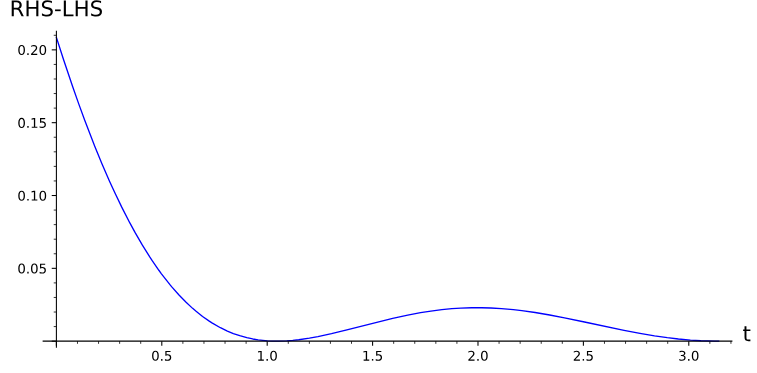Alternative proof.
Remark. Fact 1 is inspired by Terry Tao's nice idea, that is,
$\frac{\sqrt{3}}{2} \cos \frac{3(\pi-t)}{4} \leq \frac{3}{4} ( (\frac{1}{2}-\cos t) - \sigma (\frac{1}{2}-\cos t)^2 )$ in his answer.
Let
$$A := a + \frac12, \quad B := b + \frac12, $$
$$p := \frac{\frac{1}{2} \left(a b -\sqrt{a^2-1} \sqrt{b^2-1}\right) - \frac12}{a + \frac12}, \quad q := \frac{\cos t - \frac12}{a + \frac12}. $$
The desired inequality is written as
$$A^{3/4}(1 + p)^{3/4} -\frac{\sqrt{3}\, \cos\frac{3 (\pi -t)}{4}}{2 B^{1/4}} - A^{3/4}(1 + q)^{3/4} \ge 0. \tag{1}$$
By Bernoulli's inequality $(1 + u)^r \le 1 + ru$ for all $u > -1$ and $0 < r < 1$, it suffices to prove that
$$A^{3/4}\cdot \frac{1 + p}{1 + p \cdot \frac{1}{4}} -\frac{\sqrt{3}\, \cos\frac{3 (\pi -t)}{4}}{2 B^{1/4}} - A^{3/4}\left(1 + \frac{3q}{4}\right) \ge 0$$
or (multiplying both sides by $4A^{1/4}$)
$$4A\cdot \frac{1 + p}{1 + \frac{p}{4}} - 2\sqrt{3} \left(\frac{A}{B}\right)^{1/4} \cos\frac{3 (\pi -t)}{4} - 4A\left(1 + \frac{3q}{4}\right) \ge 0$$
or (using $Aq = \cos t - \frac12$)
$$4A\cdot \frac{3p}{4 + p} - 2\sqrt{3} \left(\frac{A}{B}\right)^{1/4} \cos\frac{3 (\pi -t)}{4} - 3\left(\cos t - \frac12\right) \ge 0. \tag{2}$$
Note that
$$
p = \frac{1}{2A}\cdot \frac{(a - b)^2}{(ab - 1) + \sqrt{a^2 - 1}\sqrt{b^2 - 1}} \ge \frac{1}{2A}\cdot \frac{(a - b)^2}{2ab}.
$$
Thus, we have
$$4A\cdot \frac{3p}{4 + p}
\ge 4A\cdot \frac{3\cdot \frac{1}{2A}\cdot \frac{(a - b)^2}{2ab}}{4 + \frac{1}{2A}\cdot \frac{(a - b)^2}{2ab}} = \frac{6(2a + 1)(a - b)^2}{16a^2b + a^2 + 6ab + b^2}. \tag{3}$$
From (2) and (3), it suffices to prove that
$$\frac{6(2a + 1)(a - b)^2}{16a^2b + a^2 + 6ab + b^2} - 2\sqrt{3} \left(\frac{a + \frac12}{b + \frac12}\right)^{1/4} \cos\frac{3 (\pi -t)}{4} - 3\left(\cos t - \frac12\right) \ge 0. \tag{4}$$
Fact 1. It holds that, for all $t\in [0, \pi]$,
$$- 3\left(\cos t - \frac12\right)
\ge 2\sqrt{3}\, \cos\frac{3 (\pi -t)}{4} + \frac12\left[\cos\frac{3 (\pi -t)}{4}\right]^2.$$
(Proof. Let $y = \cos \frac{\pi - t}{4}$. We have
$\mathrm{LHS} - \mathrm{RHS} =
\frac{-2y^3 - \sqrt{3}\, y^2 + 6y + \sqrt{3}}{2}(2y + \sqrt{3})(\sqrt{3} - 2y)^2 \ge 0$. )
By Fact 1, letting $u := \cos\frac{3 (\pi -t)}{4}$, it suffices to prove that
$$\frac{6(2a + 1)(a - b)^2}{16a^2b + a^2 + 6ab + b^2} - 2\sqrt{3}\left[\left(\frac{a + \frac12}{b + \frac12}\right)^{1/4} - 1\right] u + \frac12 u^2\ge 0. \tag{5}$$
By AM-GM, it suffices to prove that
$$4 \cdot \frac{6(2a + 1)(a - b)^2}{16a^2b + a^2 + 6ab + b^2}
\cdot \frac12
\ge \left(2\sqrt{3}\left[\left(\frac{a + \frac12}{b + \frac12}\right)^{1/4} - 1\right]\right)^2. \tag{6}$$
It is easy to prove that, for all $x \ge 0$,
$$(x^{1/4} - 1)^2 \le \frac{(x - 1)^2(1 + x)}{9x^2 + 22x + 1}. \tag{7}$$
From (7), letting $x = \left(\frac{a + \frac12}{b + \frac12}\right)^{1/4}$, we have
$$\left[\left(\frac{a + \frac12}{b + \frac12}\right)^{1/4} - 1\right]^2 \le \frac{2(a + b + 1)(a - b)^2}{(2b + 1)(9a^2 + 22ab + b^2 + 20a + 12b + 8)}. \tag{8}$$
From (6) and (8), it suffices to prove that
$$4 \cdot \frac{6(2a + 1)(a - b)^2}{16a^2b + a^2 + 6ab + b^2}
\cdot \frac12
\ge 12 \cdot \frac{2(a + b + 1)(a - b)^2}{(2b + 1)(9a^2 + 22ab + b^2 + 20a + 12b + 8)}$$
or
$$4 \cdot \frac{6(2a + 1)}{16a^2b + a^2 + 6ab + b^2}
\cdot \frac12
\ge 12 \cdot \frac{2(a + b + 1)}{(2b + 1)(9a^2 + 22ab + b^2 + 20a + 12b + 8)}$$
or (after clearing the denominators)
\begin{align*}
&48\,{a}^{3}b+672\,{a}^{2}{b}^{2}+48\,a{b}^{3}+192\,{a}^{3}+1152\,{a}^{
2}b+960\,a{b}^{2}\\
&\quad +564\,{a}^{2}+1272\,ba+276\,{b}^{2}+432\,a+336\,b+96\\
\ge{}& 0
\end{align*}
which is true.
We are done.


